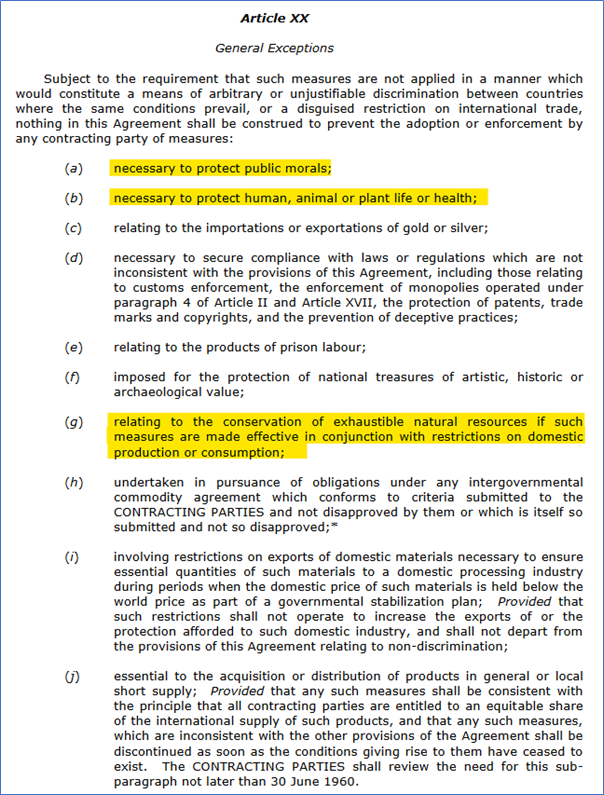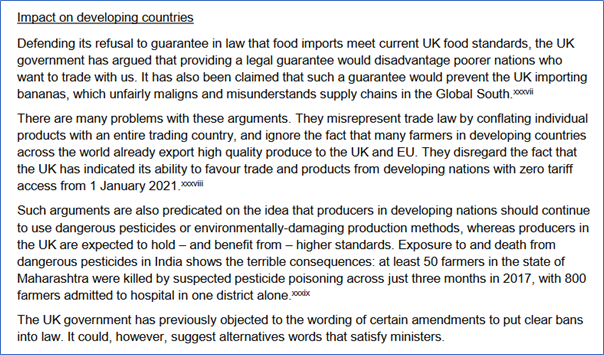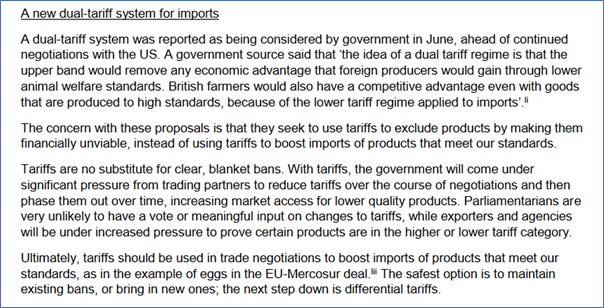The report on food standards & trade is here: https://www.sustainweb.org/resources/files/reports/Future%20British%20Standards%20Coalition%20-%20Safeguarding%20Standards.pdf
As expected it argues to keep high standards on UK imports.
But sadly it glosses over a number issues related to international trade rules. For the report to be credible, these must be addressed
1 /18 https://twitter.com/vickihird/status/1332241062472151040
As expected it argues to keep high standards on UK imports.
But sadly it glosses over a number issues related to international trade rules. For the report to be credible, these must be addressed
1 /18 https://twitter.com/vickihird/status/1332241062472151040
I’ll focus only on WTO rules: anything that might be agreed in free trade deals can go beyond WTO rules, or opt out of some constraints.
For example, *IF* the US bilaterally accepts UK animal welfare standards for its exports to the UK, then there’s no issue in the WTO
2 /18
For example, *IF* the US bilaterally accepts UK animal welfare standards for its exports to the UK, then there’s no issue in the WTO
2 /18
The biggest problem is how the report glosses over the difference between standards of PRODUCTS versus PRODUCTION METHODS.
This is such a complicated issue that it still features in lengthy threads of Twitter debate among trade experts.
Overlooking it weakens the report.
3 /18
This is such a complicated issue that it still features in lengthy threads of Twitter debate among trade experts.
Overlooking it weakens the report.
3 /18
The closest the report comes to recognising the difference is where the use of hormones is described as a “production standard”. But this  is confused. The EU (and UK) bans imports of “hormone beef” because “hormone beef” is banned domestically.
is confused. The EU (and UK) bans imports of “hormone beef” because “hormone beef” is banned domestically.
https://www.sustainweb.org/resources/files/reports/Future%20British%20Standards%20Coalition%20-%20Safeguarding%20Standards.pdf
4/18
 is confused. The EU (and UK) bans imports of “hormone beef” because “hormone beef” is banned domestically.
is confused. The EU (and UK) bans imports of “hormone beef” because “hormone beef” is banned domestically.https://www.sustainweb.org/resources/files/reports/Future%20British%20Standards%20Coalition%20-%20Safeguarding%20Standards.pdf
4/18
Production processes based on — for example — animal welfare are much more complicated, and much more controversial.
Certifying whether cattle have had hormone implants is fairly simple.
Can “welfare” be certified? Only if we agree on what it means, on objective criteria
5 /18
Certifying whether cattle have had hormone implants is fairly simple.
Can “welfare” be certified? Only if we agree on what it means, on objective criteria
5 /18
On the subject of “hormone beef”, the report seems to deny that some import bans might violate WTO agreements.
It fails to acknowledge that the ban on “hormone beef” is already WTO-illegal.
US case DS26: https://www.wto.org/english/tratop_e/dispu_e/cases_e/ds26_e.htm
Canada case DS48: https://www.wto.org/english/tratop_e/dispu_e/cases_e/ds48_e.htm
6 /18
It fails to acknowledge that the ban on “hormone beef” is already WTO-illegal.
US case DS26: https://www.wto.org/english/tratop_e/dispu_e/cases_e/ds26_e.htm
Canada case DS48: https://www.wto.org/english/tratop_e/dispu_e/cases_e/ds48_e.htm
6 /18
The section on “WTO compliance” claims “trade academics have concluded” that rejecting low standards for food is WTO compliant.
For PRODUCTS this is actually written into WTO agreements, with conditions.
But for PROCESSES the debate continues.
https://www.sustainweb.org/resources/files/reports/Future%20British%20Standards%20Coalition%20-%20Safeguarding%20Standards.pdf
7 /18
For PRODUCTS this is actually written into WTO agreements, with conditions.
But for PROCESSES the debate continues.
https://www.sustainweb.org/resources/files/reports/Future%20British%20Standards%20Coalition%20-%20Safeguarding%20Standards.pdf
7 /18
Bizarrely, the source for the claim about trade academics turns out to be Liam Fox.
The paragraph cites banning battery cages. Something specific like that might be simpler than attempting a broad concept like “animal welfare”. It might still be challenged
cites banning battery cages. Something specific like that might be simpler than attempting a broad concept like “animal welfare”. It might still be challenged
8 /18
The paragraph
 cites banning battery cages. Something specific like that might be simpler than attempting a broad concept like “animal welfare”. It might still be challenged
cites banning battery cages. Something specific like that might be simpler than attempting a broad concept like “animal welfare”. It might still be challenged8 /18
Still on WTO compliance, the report claims the UK already restricts some food on animal welfare grounds. It would be good to see some examples — I’m not aware of any but perhaps that’s my ignorance.
https://www.sustainweb.org/resources/files/reports/Future%20British%20Standards%20Coalition%20-%20Safeguarding%20Standards.pdf
9 /18
https://www.sustainweb.org/resources/files/reports/Future%20British%20Standards%20Coalition%20-%20Safeguarding%20Standards.pdf
9 /18
It goes on to say the UK could defend import bans based on animal welfare under the WTO’s SPS Agreement (food safety, animal/plant health).
I’d say the jury’s out on this. Animal welfare is not mentioned in the SPS Agreement, only health
https://www.sustainweb.org/resources/files/reports/Future%20British%20Standards%20Coalition%20-%20Safeguarding%20Standards.pdf
10 /18
I’d say the jury’s out on this. Animal welfare is not mentioned in the SPS Agreement, only health
https://www.sustainweb.org/resources/files/reports/Future%20British%20Standards%20Coalition%20-%20Safeguarding%20Standards.pdf
10 /18
Then, GATT Art.20.
This creates exceptions, not for “animal welfare” and “environmental controls”, but “human, animal or plant life or health”, “the conservation of exhaustible natural resources”.
Expect a legal debate. Welfare = health?
https://www.sustainweb.org/resources/files/reports/Future%20British%20Standards%20Coalition%20-%20Safeguarding%20Standards.pdf
11 /18
This creates exceptions, not for “animal welfare” and “environmental controls”, but “human, animal or plant life or health”, “the conservation of exhaustible natural resources”.
Expect a legal debate. Welfare = health?
https://www.sustainweb.org/resources/files/reports/Future%20British%20Standards%20Coalition%20-%20Safeguarding%20Standards.pdf
11 /18
Here’s GATT Art.20 and jurisprudence: https://www.wto.org/english/res_e/publications_e/ai17_e/gatt1994_art20_jur.pdf
Note the EU justified banning seal products under “(a) necessary to protect public morals” (see jurisprudence in that document)
And here’s more on Art.20 and environmental measures: https://www.wto.org/english/tratop_e/envir_e/envt_rules_exceptions_e.htm
12 /18
Note the EU justified banning seal products under “(a) necessary to protect public morals” (see jurisprudence in that document)
And here’s more on Art.20 and environmental measures: https://www.wto.org/english/tratop_e/envir_e/envt_rules_exceptions_e.htm
12 /18
More broadly, the report argues that the UK could be a leader in the WTO in pushing for rules that allow measures based on higher standards
This feeds into the government’s vanity-narrative about “UK leadership”. Far too soon to talk about that
https://www.sustainweb.org/resources/files/reports/Future%20British%20Standards%20Coalition%20-%20Safeguarding%20Standards.pdf
13 /18
This feeds into the government’s vanity-narrative about “UK leadership”. Far too soon to talk about that
https://www.sustainweb.org/resources/files/reports/Future%20British%20Standards%20Coalition%20-%20Safeguarding%20Standards.pdf
13 /18
The report totally misunderstands what happens at WTO ministerial conferences. It would be amazing if ministers discussed the operation and implementation of the SPS Agreement. At best, there’ll be a dry bureaucratic report
https://www.sustainweb.org/resources/files/reports/Future%20British%20Standards%20Coalition%20-%20Safeguarding%20Standards.pdf
14 /18
https://www.sustainweb.org/resources/files/reports/Future%20British%20Standards%20Coalition%20-%20Safeguarding%20Standards.pdf
14 /18
The report calls for the UK to spearhead amending the SPS Agreement. No chance. So far members have decided the agreement does not need amending, preferring to focus on improving implementation. It was not in the Doha Round package of negotiations
https://www.sustainweb.org/resources/files/reports/Future%20British%20Standards%20Coalition%20-%20Safeguarding%20Standards.pdf
15 /18
https://www.sustainweb.org/resources/files/reports/Future%20British%20Standards%20Coalition%20-%20Safeguarding%20Standards.pdf
15 /18
It’s also confused about the relationship between the WTO and WHO/FAO Codex Alimentarius
They’re entirely separate
The WTO SPS Agreement just recognises Codex as the international standards-setter for food safety
Standards aren’t set in the WTO
https://www.sustainweb.org/resources/files/reports/Future%20British%20Standards%20Coalition%20-%20Safeguarding%20Standards.pdf
16 /18
They’re entirely separate
The WTO SPS Agreement just recognises Codex as the international standards-setter for food safety
Standards aren’t set in the WTO
https://www.sustainweb.org/resources/files/reports/Future%20British%20Standards%20Coalition%20-%20Safeguarding%20Standards.pdf
16 /18
And yet animal welfare HAS been discussed in the WTO—in the Doha Round farm talks, in relation to subsidies. The response? A chorus of objections from developing countries who said their priority was human welfare. They will need to be persuaded.
https://www.sustainweb.org/resources/files/reports/Future%20British%20Standards%20Coalition%20-%20Safeguarding%20Standards.pdf
17 /18
https://www.sustainweb.org/resources/files/reports/Future%20British%20Standards%20Coalition%20-%20Safeguarding%20Standards.pdf
17 /18
Finally, it’s unclear if the dual tariff system would cause problems in the WTO, also debated at length.
Perhaps if products meeting welfare standards were re-categorised as separate “products” from those that don’t. Not simple to do.
https://www.sustainweb.org/resources/files/reports/Future%20British%20Standards%20Coalition%20-%20Safeguarding%20Standards.pdf
18/18 ends
Perhaps if products meeting welfare standards were re-categorised as separate “products” from those that don’t. Not simple to do.
https://www.sustainweb.org/resources/files/reports/Future%20British%20Standards%20Coalition%20-%20Safeguarding%20Standards.pdf
18/18 ends

 Read on Twitter
Read on Twitter













